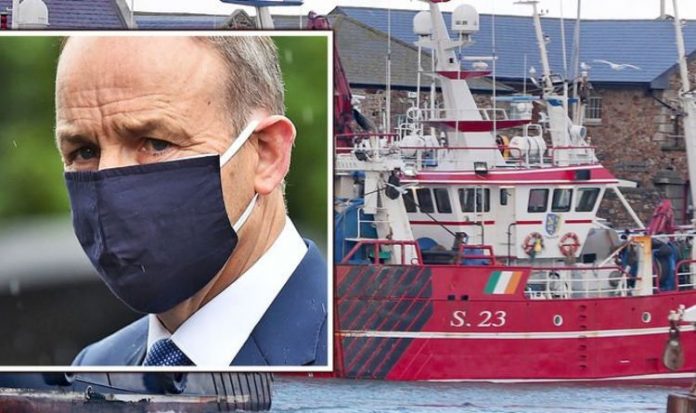Brexit: Andrew Bridgen suggests possible fishing compromise
Brexit talks were extended after Prime Minister Boris Johnson agreed to remove the most contentious part of the Internal Market Bill regarding the Irish border, which broke international law. Mixed reports have since emerged over the likelihood of an actual deal being reached by the time the transition period is up, on December 31. While Downing Street has warned that no deal is still the “most likely” outcome, European Commission President Ursula von der Leyen has noted there’s been “movement” and that “we are on the very last mile to go” in the attempt to secure a free trade agreement.
However, fishing rights continue to be a fundamental sticking point, according to the EU’s chief negotiator Michel Barnier.
The EU wants unfettered access to British waters for a decade in exchange for a deal, but Mr Johnson’s cabinet wants the bloc to agree to a “glide path” instead.
This would involve a five to seven-year transition from current arrangements to annual rearrangements, when Britain gets to decide who has access to what.
However, if no agreement can be reached by the end of the month the UK will take full control of its waters, subsequently banning EU nations from fishing in them without Britain’s permission.
This is set to cause major upset with the Emerald Isle and may cause the fishing industry there to take a huge dive.
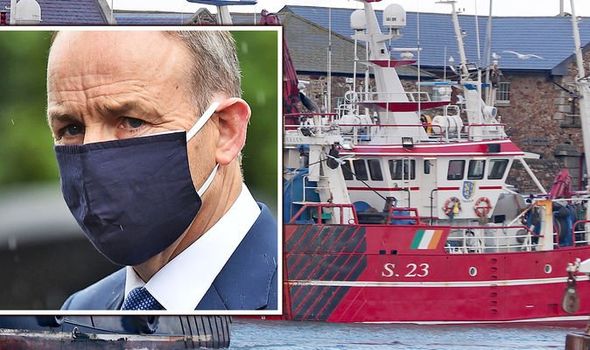
Taoiseach Micheal Martin may have to deal with furious fishermen if there is no trade deal (Image: Getty)
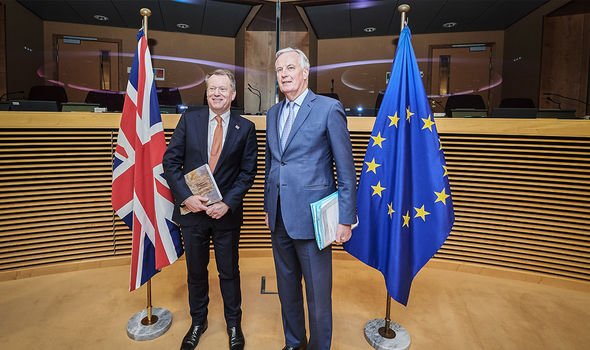
David Frost (the chief negotiator for the UK) and the chief negotiator for the EU Michel Barnier (Image: PA)
Journalist Grainne Ni Aodha explained: “Over two-thirds of the EU’s fishing waters and two-thirds of the EU’s fishing catch belong to Ireland and the UK.
“Around half of Ireland’s fishing catch takes place in UK waters.
“Ireland’s fishermen and fishing industry are under threat of being locked out of waters that had been frequented by Irish trawlers long before either country joined the EU.”
CEO of the Irish South and West Fish Producers Organisation, Patrick Murphy, said that Ireland had not looked for fishing waters further afield, as it had enough produce in its own waters combined with the UK’s.
He explained: “We’re the jewel in the future of European waters: our fish, they come to spawn here, they go to the juvenile stage and they swim off to all the other countries.”
He added that the French and Spanish coasts are too deep for trawling, so European fishermen rely on coming to Ireland, the UK and Iceland when the fish spawn.
READ MORE: Biden ‘may have been good for Brexit’ — until Johnson broke law
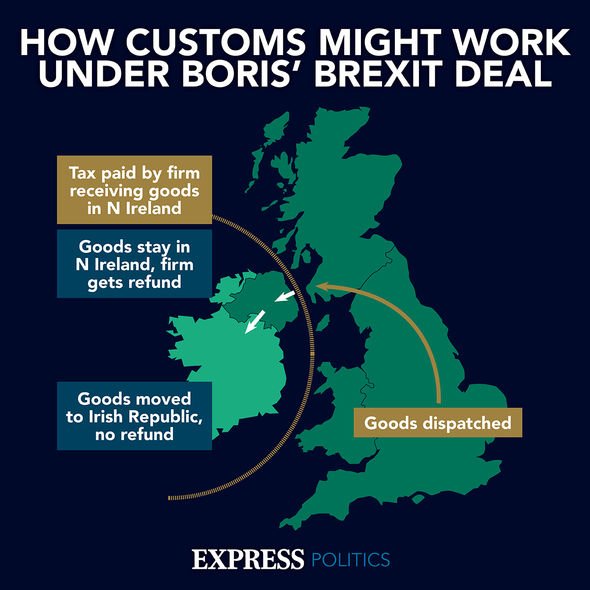
Ireland’s border has been an area of contention already throughout the Brexit negotiations (Image: Express.co.uk)
Writing for The Irish Journal, Ms Aodha explained: “Irish crews fear that if there’s no deal on fisheries and the UK leave the EU, the waters around Ireland will see even more traffic from Spanish, French and other European trawlers.”
Mr Murphy also noted that his nation would then have to lose the UK farm, and share the little one it has left with the rest of the EU, leaving the Irish with the “smallest share of fish in that farm”.
He explained: “The French would have 10 times our monkfish quota in the Celtic Sea than we would.”
If the Irish seafood sector does not have access to British waters, it will halve in value over the next two years.
There are more than 16,000 people working directly or indirectly for the Irish fishing industry and is currently worth €1.2billion (£1.09billion).
DON’T MISS
Ireland’s HUGE debt to EU exposed as Brussels ‘given free reign’ [INSIGHT]
Biden’s ‘love letter’ to Irish roots unveiled as trade deal fears grow [EXPLAINED]
Leo Varadkar’s negotiation tactics with EU over Irish border shamed [EXPOSED]
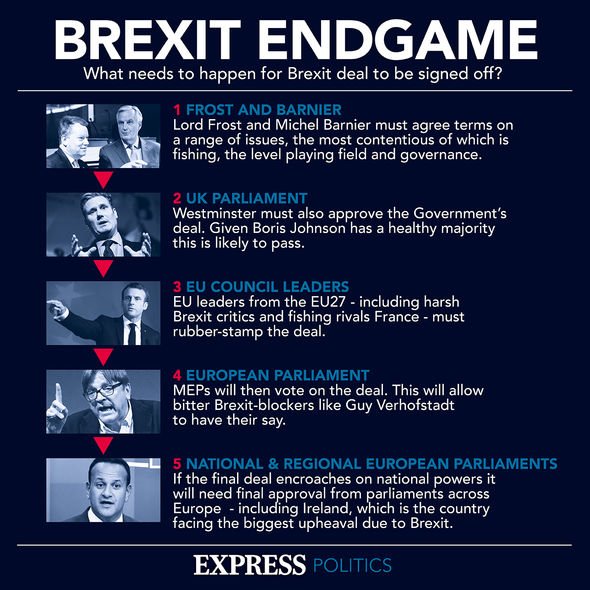
What needs to happen for the Brexit deal to be signed off (Image: Express.co.uk)
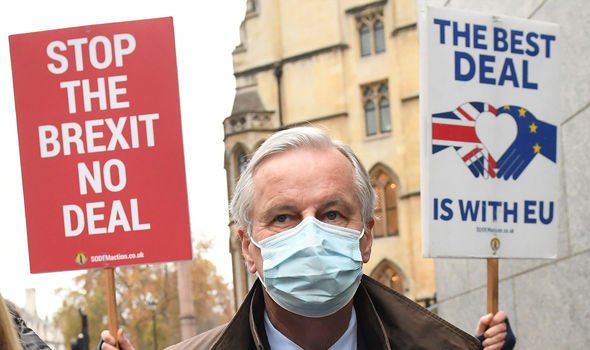
There have mixed reports about the likelihood of a trade deal by the end of December (Image: PA)
The total value of fish caught in the Irish sea by the EU comes to a total of €6.2billion (£5.6billion) — but Ireland does share more than 50 species with the UK.
Sean O’Donoghue of Killybegs Fishermen’s Organisation told the Irish Journal that without a free trade deal, fishermen would be heading for “an unmitigated disaster for us”.
The Irish Mirror claimed that Irish fishermen are also preparing themselves for a “prawn war” if no deal becomes a reality.
The 2,000 strong fleet of Irish fishermen are responding to the Government’s claim that it intends to use the Royal Navy gunboats to stop European fishermen entering UK waters.
Trawlers used to ram each other in fishing waters in the battle for fish stocks in the “Cod Wars” between Britain and Iceland before the nations reached a trade deal.
Some fear the Smalls — an area off Cornwall’s coast — could become a similarly problematic source of tension between Irish and British fishermen.
Rockall, a tiny Atlantic island, could also evolve into a battleground in the fight for fish if no deal goes ahead.
Brexit: Boris Johnson ‘battling for Britain’ says Barclay
Yet, amid murmurs of a compensation scheme for EU member states, a Government source recently noted: “It’s not impossible we might do that, but it won’t be the thing on which a deal hinges.”
Britain is allegedly prepared to let some nations keep 50 percent of their current quotas in the first 12 months after it splits from the trade bloc.
This would then gradually reduce over time, but more details are yet to be released.
Paul Boyd from Clogherhead Fishing Co-operative, told the Irish Mirror that the industry is on the edge of its seat.
He said: “The problem is access to fish and revenue. If we can’t fish in British waters our revenue will drop by a minimum of 40 percent.
“And for some fishermen — depending on what they fish for — it will be 60 percent.
“We have had this problem for the past four years and nobody seems to be doing anything about it.”
He added: “I hope and pray there will be a deal. But I feel myself it might take three or four years.”
